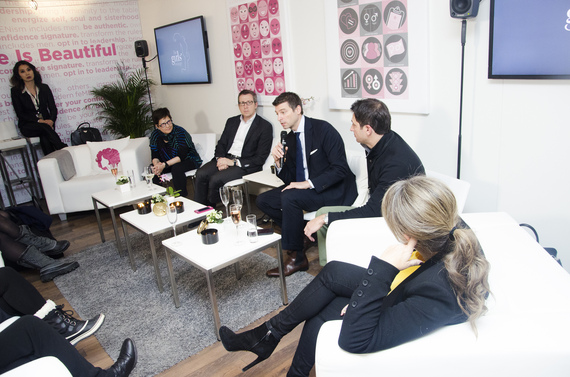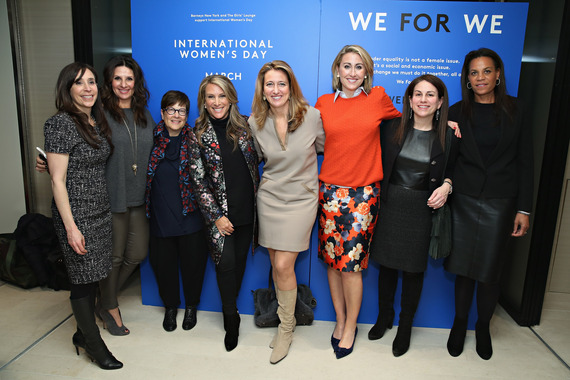Every week, as I browse news headlines, attend and speak at global conferences, and catch up with business associates and girlfriends across the country -- I see it, hear it and feel it. The third wave of feminism is rising.
Rosie Rios, Treasurer of the United States, successfully lobbied to have a woman placed on the $10 bill. The White House issued a proposal that aims to have private companies share their salary data in efforts to reduce the gender pay gap. The World Economic Forum in Davos placed gender parity squarely on its agenda. Box office draw Jennifer Lawrence spoke up about disproportionate salaries in Hollywood (with insight from the Sony leak), and Reese Witherspoon urged fans to sign the Equal Rights Petition and support Patricia Arquette and Senator Hannah-Beth Jackson in the fight for "equal pay, equal healthcare and equal protection under the law."
These moments have become a movement. I've always said it takes the power of the pack to activate change.
I witnessed this at the World Economic Forum (WEF) in Davos where The Girls' Lounge joined the discussion for the first time, and quickly became the destination for females in attendance (all 18 percent), along with our male colleagues who recognize gender equality is not a "female" issue, it's a social and economic issue.
"I'm not sure [gender parity] has to be scary," said Adam Bain, chief operating officer of Twitter, inside the lounge. "There's a whole body of research that shows that more diverse companies are more successful. I don't think that's correlation, I think that's causation."
Supporting this notion, a recent McKinsey Power of Parity Study, stated the global annual GDP could increase by as much as 26% if women and men play an identical role in the labor market by 2025. That's an additional $12 trillion in the world's economy!
But this scope of progress will only be achieved if the global workforce changes its course. As Vice President Joe Biden said at WEF, "economies don't work if there aren't women involved integrally."
Back on our side of the pond, the MAKERS Conference in Los Angeles also included powerful conversations recognizing that if corporate America continues at its current pace, it will take 100 years to get to parity. Joanna Barsh, director emeritus at McKinsey, used her "15 minutes" to delve into the "glass half-full" of things we've accomplished in the last twenty years, including the fact that today we have 108 women in Congress - a new record. She said people want leadership qualities that include more female archetypes: reasonable, loyal, flexible, collaborative, empathetic and selfless, while common masculine archetypes are described as decisive, analytical, aggressive and proud. Her powerful presentation illustrated that "women are stuck in the middle," as in middle management, with low numbers accelerating into vice president and C-suite roles, and few translating into board seats.
Women find themselves in middle management at the same lifecycle stage when they're smack dab in the middle of raising their families (and caring for aging parents). Many male managers feel uncomfortable speaking to them about how they are balancing their needs at work and home - so they don't. And instead the conversations never happen and women slowly opt out. This is why transparency on salary, promotions, and development of the pipeline are so important, because without it we will never achieve parity.
That is also why it's time for 'We for We.' We for We means we've recognized that workplace parity is in everyone's best interest. The economics of equality are clear. Gloria Steinem defined feminism in the 60s in what I refer to as the 'she for she' wave of equality. Our second wave invited men into the conversation, encouraging their support as husbands, fathers and colleagues to redefine gender roles, and now we recognize we're all in this together. Femenism must include men.
Acting on this, Barneys New York joined the #WeForWe discussion ahead of International Women's Day (on March 8) by promoting the hashtag and event in store windows, fueling promotion through social media, and hosting an intimate salon at the Madison Avenue location. I was happy to help organize this gathering and have Joanna discuss the findings of the McKinsey study with a group of executives from across industries - media, education, government and retail -- to raise awareness and inspire action for the 'We for We' movement.
As we dig our heels into 2016, I encourage you to help close the gap by adhering to:
· Hiring the best talent and giving them equal pay for equal work
· Building a workplace culture that embraces work-life balance
· Ensuring that every step of management is focused on developing its employees
· Recognizing feminine leadership qualities as integral to the work environment
· Aiming for true partnership in the home, as this impacts every woman's performance on the job
I'm excited for what's to come, including the White House's first "United State of Women": The White House Summit to be held in May. As Joanna said, "Get the data and know the 'why'" and we'll keep closing the pay gap - together. If we could have done it alone, we would have by now.

